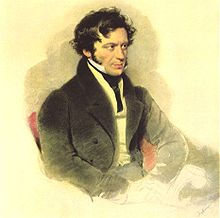Franz Grillparzer | |
|---|---|
 Portrait of Franz Grillparzer, by Moritz Michael Daffinger, 1827 | |
| Born | 15 January 1791 Vienna, Austrian Empire |
| Died | 21 January 1872 (aged 81) Vienna, Austria-Hungary |
| Resting place | Hietzing Cemetery |
| Occupation | Dramatist |
| Language | Austrian German |
| Nationality | Austrian |
| Alma mater | University of Vienna |
| Period | 1817 – 1872 |
| Notable works |
|
| Signature | |
Franz Seraphicus Grillparzer (German: [ˌfʁant͡s ˈɡʁɪlˌpaʁt͡sɐ] 15 January 1791 – 21 January 1872) was an Austrian writer who was considered to be the leading Austrian dramatist of the 19th century. His plays were and are frequently performed at the Burgtheater in Vienna.[1] He also wrote the oration for Ludwig van Beethoven's funeral,[2] as well as the epitaph for his friend Franz Schubert.
While writing during the period of Romanticism, Grillparzer's poetic language owes far more to the period of Classicism which reigned during his formative years. Committed to the classical ideals of aesthetic beauty and morality, his plots shy away from the realism which developed during his time, preferring instead to use the theater to address spiritual values, which in the words of the dying queen of his Libussa, would only come after the period of Materialism had passed. Due to the identity-creating use of his works, especially after World War II, he was named as the national poet of Austria.[3]
- ^ "Franz Grillparzer A Century of Criticism". Boydell & Brewer. Archived from the original on 2020-07-23. Retrieved 2020-07-23.
- ^ Sonneck, O. G., ed. (1967). Beethoven: impressions by his contemporaries (Dover ed.). New York: Dover Publications. p. 229. ISBN 978-0-486-21770-3.
- ^ "Franz Grillparzer - one of the most contradictory poet personalities in Austria". Time Travel Vienna. 24 March 2021.